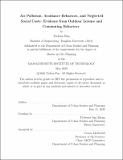Air pollution, avoidance behaviors, and neglected social costs : evidence from outdoor leisure and commuting behaviors
Author(s)
Fan, Yichun(Urban city planner)Massachusetts Institute of Technology.
Download1193555858-MIT.pdf (5.361Mb)
Other Contributors
Massachusetts Institute of Technology. Department of Urban Studies and Planning.
Advisor
Siqi Zheng.
Terms of use
Metadata
Show full item recordAbstract
The social cost of air pollution depends on both its biophysical impacts on health and productivity and the dynamic avoidance behaviors citizens proactively adopt. The literature has almost exclusively focused on the direct impacts, and the limited research looking into the avoidance behaviors has only considered monetary defensive expenditure. Building upon a theoretical framework incorporating the broader pollution costs into existing economic models, I derive empirical evidence of the hidden opportunity cost and social cost of pollution avoidance behaviors. For opportunity cost, I focus on the foregone outdoor leisure activities and the related welfare loss due to pollution avoidance, relying on billions of cell phone location inquiries from 10,499 parks all over China. Using the pollution blown from upwind cities as the instrumental variable for local pollution, I show that heavy PM2.5 pollution reduces park visitation by 10% in northern Chinese cities. If the number of heavily-polluted days reduces by 25% in northern China, the welfare gain from leisure activity is about 83.5 million USD. For social cost, I show that pollution awareness affects commuting behaviors, by conducting a survey for 2,258 non-vehicle commuters in Zhengzhou, China. If fully aware of exposure risk, up to 14.8% of non-vehicle travelers intend to switch to motor vehicle commuting (private car/ taxi) on polluted days, 13.9% fewer people are willing to choose active commuting even if they can receive a subsidy, and soft policies like Green Nudge completely lose effect. This avoidance behavior generates more emissions for the society and creates a "mitigation-avoidance dilemma" for transportation policies. The thesis calls for more attention to quantifying the broader social impacts of pollution by including the non-market value of avoidance behaviors; these impacts create substantial welfare loss and social challenges awaiting more balanced policy decision-making to consider these trade-offs.
Description
Thesis: M.C.P., Massachusetts Institute of Technology, Department of Urban Studies and Planning, May, 2020 Cataloged from the official PDF of thesis. Includes bibliographical references (pages 81-88).
Date issued
2020Department
Massachusetts Institute of Technology. Department of Urban Studies and PlanningPublisher
Massachusetts Institute of Technology
Keywords
Urban Studies and Planning.